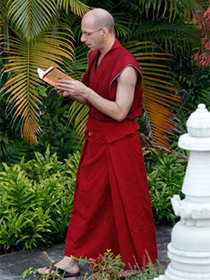- Home
- FPMT Homepage

Foundation for the Preservation of the Mahayana Tradition
The FPMT is an organization devoted to preserving and spreading Mahayana Buddhism worldwide by creating opportunities to listen, reflect, meditate, practice and actualize the unmistaken teachings of the Buddha and based on that experience spreading the Dharma to sentient beings. We provide integrated education through which people’s minds and hearts can be transformed into their highest potential for the benefit of others, inspired by an attitude of universal responsibility and service. We are committed to creating harmonious environments and helping all beings develop their full potential of infinite wisdom and compassion. Our organization is based on the Buddhist tradition of Lama Tsongkhapa of Tibet as taught to us by our founders Lama Thubten Yeshe and Lama Thubten Zopa Rinpoche.
- Willkommen
Die Stiftung zur Erhaltung der Mahayana Tradition (FPMT) ist eine Organisation, die sich weltweit für die Erhaltung und Verbreitung des Mahayana-Buddhismus einsetzt, indem sie Möglichkeiten schafft, den makellosen Lehren des Buddha zuzuhören, über sie zur reflektieren und zu meditieren und auf der Grundlage dieser Erfahrung das Dharma unter den Lebewesen zu verbreiten.
Wir bieten integrierte Schulungswege an, durch denen der Geist und das Herz der Menschen in ihr höchstes Potential verwandelt werden zum Wohl der anderen – inspiriert durch eine Haltung der universellen Verantwortung und dem Wunsch zu dienen. Wir haben uns verpflichtet, harmonische Umgebungen zu schaffen und allen Wesen zu helfen, ihr volles Potenzial unendlicher Weisheit und grenzenlosen Mitgefühls zu verwirklichen.
Unsere Organisation basiert auf der buddhistischen Tradition von Lama Tsongkhapa von Tibet, so wie sie uns von unseren Gründern Lama Thubten Yeshe und Lama Thubten Zopa Rinpoche gelehrt wird.
- Bienvenidos
La Fundación para la preservación de la tradición Mahayana (FPMT) es una organización que se dedica a preservar y difundir el budismo Mahayana en todo el mundo, creando oportunidades para escuchar, reflexionar, meditar, practicar y actualizar las enseñanzas inconfundibles de Buda y en base a esa experiencia difundir el Dharma a los seres.
Proporcionamos una educación integrada a través de la cual las mentes y los corazones de las personas se pueden transformar en su mayor potencial para el beneficio de los demás, inspirados por una actitud de responsabilidad y servicio universales. Estamos comprometidos a crear ambientes armoniosos y ayudar a todos los seres a desarrollar todo su potencial de infinita sabiduría y compasión.
Nuestra organización se basa en la tradición budista de Lama Tsongkhapa del Tíbet como nos lo enseñaron nuestros fundadores Lama Thubten Yeshe y Lama Zopa Rinpoche.
A continuación puede ver una lista de los centros y sus páginas web en su lengua preferida.
- Bienvenue
L’organisation de la FPMT a pour vocation la préservation et la diffusion du bouddhisme du mahayana dans le monde entier. Elle offre l’opportunité d’écouter, de réfléchir, de méditer, de pratiquer et de réaliser les enseignements excellents du Bouddha, pour ensuite transmettre le Dharma à tous les êtres. Nous proposons une formation intégrée grâce à laquelle le cœur et l’esprit de chacun peuvent accomplir leur potentiel le plus élevé pour le bien d’autrui, inspirés par le sens du service et une responsabilité universelle. Nous nous engageons à créer un environnement harmonieux et à aider tous les êtres à épanouir leur potentiel illimité de compassion et de sagesse. Notre organisation s’appuie sur la tradition guéloukpa de Lama Tsongkhapa du Tibet, telle qu’elle a été enseignée par nos fondateurs Lama Thoubtèn Yéshé et Lama Zopa Rinpoché.
Visitez le site de notre Editions Mahayana pour les traductions, conseils et nouvelles du Bureau international en français.
Voici une liste de centres et de leurs sites dans votre langue préférée
- Benvenuto
L’FPMT è un organizzazione il cui scopo è preservare e diffondere il Buddhismo Mahayana nel mondo, creando occasioni di ascolto, riflessione, meditazione e pratica dei perfetti insegnamenti del Buddha, al fine di attualizzare e diffondere il Dharma fra tutti gli esseri senzienti.
Offriamo un’educazione integrata, che può trasformare la mente e i cuori delle persone nel loro massimo potenziale, per il beneficio di tutti gli esseri, ispirati da un’attitudine di responsabilità universale e di servizio.
Il nostro obiettivo è quello di creare contesti armoniosi e aiutare tutti gli esseri a sviluppare in modo completo le proprie potenzialità di infinita saggezza e compassione.
La nostra organizzazione si basa sulla tradizione buddhista di Lama Tsongkhapa del Tibet, così come ci è stata insegnata dai nostri fondatori Lama Thubten Yeshe e Lama Zopa Rinpoche.
Di seguito potete trovare un elenco dei centri e dei loro siti nella lingua da voi prescelta.
- 欢迎 / 歡迎
简体中文
“护持大乘法脉基金会”( 英文简称:FPMT。全名:Foundation for the Preservation of the Mahayana Tradition) 是一个致力于护持和弘扬大乘佛法的国际佛教组织。我们提供听闻,思维,禅修,修行和实证佛陀无误教法的机会,以便让一切众生都能够享受佛法的指引和滋润。
我们全力创造和谐融洽的环境, 为人们提供解行并重的完整佛法教育,以便启发内在的环宇悲心及责任心,并开发内心所蕴藏的巨大潜能 — 无限的智慧与悲心 — 以便利益和服务一切有情。
FPMT的创办人是图腾耶喜喇嘛和喇嘛梭巴仁波切。我们所修习的是由两位上师所教导的,西藏喀巴大师的佛法传承。
繁體中文
護持大乘法脈基金會”( 英文簡稱:FPMT。全名:Found
ation for the Preservation of the Mahayana Tradition ) 是一個致力於護持和弘揚大乘佛法的國際佛教組織。我們提供聽聞, 思維,禪修,修行和實證佛陀無誤教法的機會,以便讓一切眾生都能 夠享受佛法的指引和滋潤。 我們全力創造和諧融洽的環境,
為人們提供解行並重的完整佛法教育,以便啟發內在的環宇悲心及責 任心,並開發內心所蘊藏的巨大潛能 — 無限的智慧與悲心 – – 以便利益和服務一切有情。 FPMT的創辦人是圖騰耶喜喇嘛和喇嘛梭巴仁波切。
我們所修習的是由兩位上師所教導的,西藏喀巴大師的佛法傳承。 察看道场信息:
- FPMT Homepage
- News/Media
-
- Study & Practice
-
-
- About FPMT Education Services
- Latest News
- Programs
- New to Buddhism?
- Buddhist Mind Science: Activating Your Potential
- Heart Advice for Death and Dying
- Discovering Buddhism
- Living in the Path
- Exploring Buddhism
- FPMT Basic Program
- FPMT Masters Program
- FPMT In-Depth Meditation Training
- Maitripa College
- Lotsawa Rinchen Zangpo Translator Program
- Universal Education for Compassion & Wisdom
- Online Learning Center
-
- Prayers & Practice Materials
- Overview of Prayers & Practices
- Full Catalogue of Prayers & Practice Materials
- Explore Popular Topics
- Benefiting Animals
- Chenrezig Resources
- Death & Dying Resources
- Lama Chopa (Guru Puja)
- Lama Zopa Rinpoche: Compendium of Precious Instructions
- Lama Zopa Rinpoche: Life Practice Advice
- Lama Zopa Rinpoche Practice Series
- Lamrim Resources
- Mantras
- Prayer Book Updates
- Purification Practices
- Sutras
- Thought Transformation (Lojong)
- Audio Materials
- Dharma Dates - Tibetan Calendar
- Translation Services
- Publishing Services
- Ways to Offer Support
- Prayers & Practice Materials
-
- Teachings and Advice
- Find Teachings and Advice
- Lama Zopa Rinpoche Advice Page
- Lama Zopa Rinpoche: Compendium of Precious Instructions
- Lama Zopa Rinpoche Video Teachings
- ༧སྐྱབས་རྗེ་བཟོད་པ་རིན་པོ་ཆེ་མཆོག་ནས་སྩལ་བའི་བཀའ་སློབ་བརྙན་འཕྲིན།
- Podcasts
- Lama Yeshe Wisdom Archive
- Buddhism FAQ
- Dharma for Young People
- Resources on Holy Objects
- Teachings and Advice
-
-
*If a menu item has a submenu clicking once will expand the menu clicking twice will open the page.
-
-
- Centers
-
- Teachers
-
- Projects
-
-
-
-
*If a menu item has a submenu clicking once will expand the menu clicking twice will open the page.
-
-
- FPMT
-
-
-
-
-
If you know the psychological nature of your own mind, depression is spontaneously dispelled; instead of being enemies and strangers, all living beings become your friends. The narrow mind rejects; wisdom accepts. Check your own mind to see whether or not this is true.
Lama Thubten Yeshe
-
-
-
- Shop
-
-
-
The Foundation Store is FPMT’s online shop and features a vast selection of Buddhist study and practice materials written or recommended by our lineage gurus. These items include homestudy programs, prayers and practices in PDF or eBook format, materials for children, and other resources to support practitioners.
Items displayed in the shop are made available for Dharma practice and educational purposes, and never for the purpose of profiting from their sale. Please read FPMT Foundation Store Policy Regarding Dharma Items for more information.
-
-
Projects
14
Continued Support to Prisoners Wishing to Study Dharma
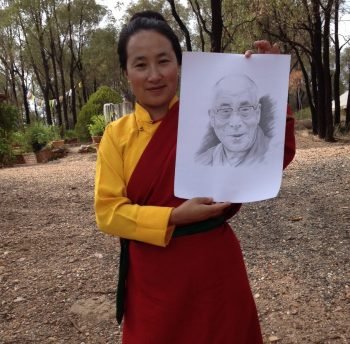
Khadro-la at Thubten Shedrup Ling Monastery with a drawing of His Holiness the Dalai Lama by one of LPPA (Australia) students. Photo courtesy of Liberation Prison Project.
Liberation Prison Project (LPP) is an FPMT international project founded in 1996 dedicated to supporting students around the world in prison who wish to study Dharma. Since its inception, LPP has helped thousands of prisoners worldwide study Buddha’s teachings and develop a sincere practice of Buddhism.
Over the years, LPP has offered hundreds of free subscriptions of Mandala to prisoners. This had been made possible due to the kindness of a benefactor, through Friends of FPMT who donated their subscriptions to prisoners, and through grants from the International Merit Box Fund. Most recently we were delighted to offer a grant from the Education and Preservation Fund to LPP in 2020 so that the teachings and articles in Mandala will continue to reach prisoner-students interested in exploring Buddhism via FPMT. As Mandala is no longer a print magazine and all content is being published online, LPP is now looking at ways to print either the complete magazine or selected articles and distribute them freely to those in prison who have committed to their Dharma practice.
Director Ven. Thubten Chokyi reports, “LPP will use the grant funds to print and distribute Mandala to LPP students. A lot of our time so far this year has been on distributing the Enjoy Life Liberated from Prison book, Liberation calendar and the higher demand for resources we get from prisoners typically in the first few months of the year.” Depending on the final costs for printing and mailing, LPP will determine how many copies of Mandala they will be able to send and how long this latest grant will last for this purpose.

Enjoy Life Liberated from the Inner Prison has been published as a fundraiser for Liberation Prison Project. This book is comprised of years of letters of advice Lama Zopa Rinpoche has given to prisoners on how to use their time in prison in the most meaningful way—to bring them to enlightenment.
Community Service, such as that provided by the Liberation Prison Project, is one of FPMT’s Five Pillars of Service.
Thanks to all who support the FPMT Education and Preservation Fund which enables grants like this to continue for the benefit of sincere practitioners wishing to enrich their Dharma education.
4
Tibetan Elders Creating Merit in Elderly Homes in India
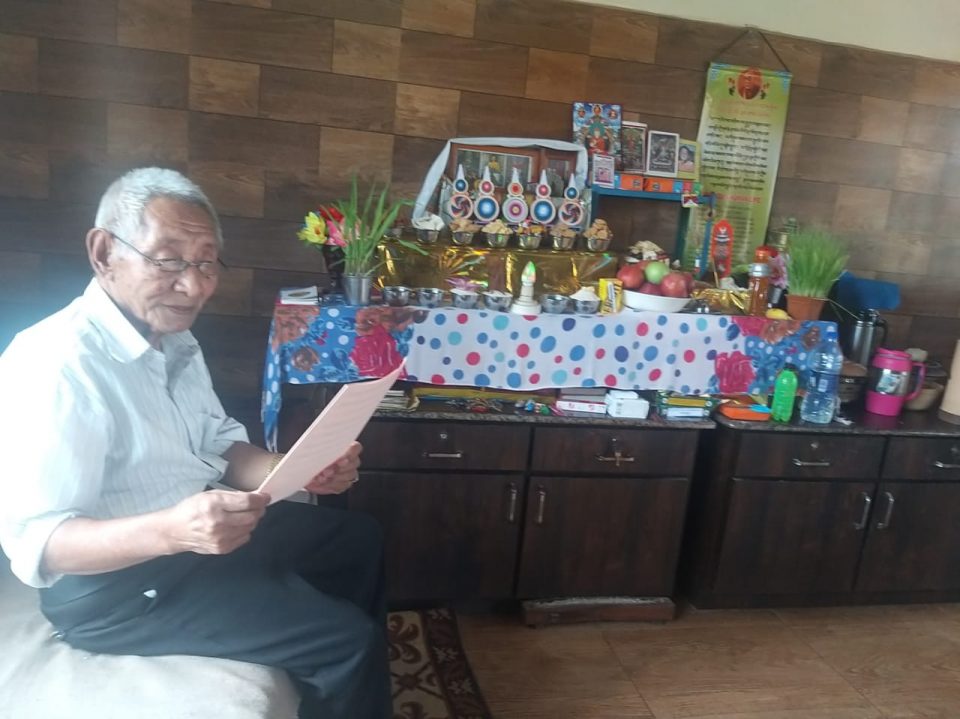
A Tibetan elder from Lugsum Sanduling, Bylakuppe, reciting the Diamond Cutter Sutra on Lama Zopa Rinpoche’s advice.
Advice for the Elderly
Lama Zopa Rinpoche recently offered extensive advice on different ways to help and benefit the elderly, particularly Tibetans in Nepal and India, who are Buddhist. Rinpoche has made the point that as Buddhists we shouldn’t only give charity of food and shelter to the elderly—we also can offer Dharma to them as well. In this recent teaching, Rinpoche mentioned the importance of using the time when one is in an elderly home to create merit and purify as much as possible, for example by listening to Dharma teachings and reciting sutras. Rinpoche explained the importance of displaying certain mantras and images of holy objects, buddhas, deities, and Buddha pure lands so the elders can look at beautiful images and pray to be reborn there.
Rinpoche also composed a text for the elders to recite, similar to the Method to Transform daily motivation practice.
Dhondenling Tibetan Settlement, located in Kollegal, India, is the most remote and underdeveloped Tibetan settlements in southern India. The settlement consists of twenty-two villages, and an elderly home. The elderly home has a capacity for thirty-two elderly Tibetans residents which FPMT Charitable Projects has been supporting since 2015. Rinpoche requested that the elders recite the Vajra Cutter Sutra regularly and also, from time to time, to receive Dharma teachings. After receiving this advice they immediately arranged for two weeks of teachings on the Vajra Cutter Sutra from a qualified teacher. This advice was also shared with Lugsum Samduling Home for the Aged and Disabled, a home in Bylakuppe, India, which cares for thirty-seven aging Tibetans. They were very happy to receive this personal advice from Rinpoche and sent photos and videos of the elders reciting the sutra and also receiving teachings and the oral transmission of the sutra.
Please enjoy this video of the elders of Lugsum Samduling reciting the Vajra Cutter Sutra:
https://www.youtube.com/watch?v=snLBD48GRlM
Rinpoche always advises elderly homes and hospices to have beautifully framed holy images at the facility so the elders can always see them and create merit. Rinpoche also suggests to always display Namgyalma mantras in every room so that even mosquitoes, ants, and insects get purified while they are in that particular room. In addition, to have an image of the deity Amoghapasha for the people in the home. Seeing this deity purifies the five heavy negative karmas without break and the negative karma of abandoning holy Dharma. Rinpoche also advises having thangkas of different pure lands, so—depending on the pure land you have an affinity for—one can look at that particular image of the pure land and make prayers to be reborn there. Rinpoche also has explained the benefits of playing mantras, sutras, and Dharma teachings, and if possible to go around holy objects or turn prayer wheels. All of these activities leave positive imprints on the mind and this is so important, especially when one is close to passing.
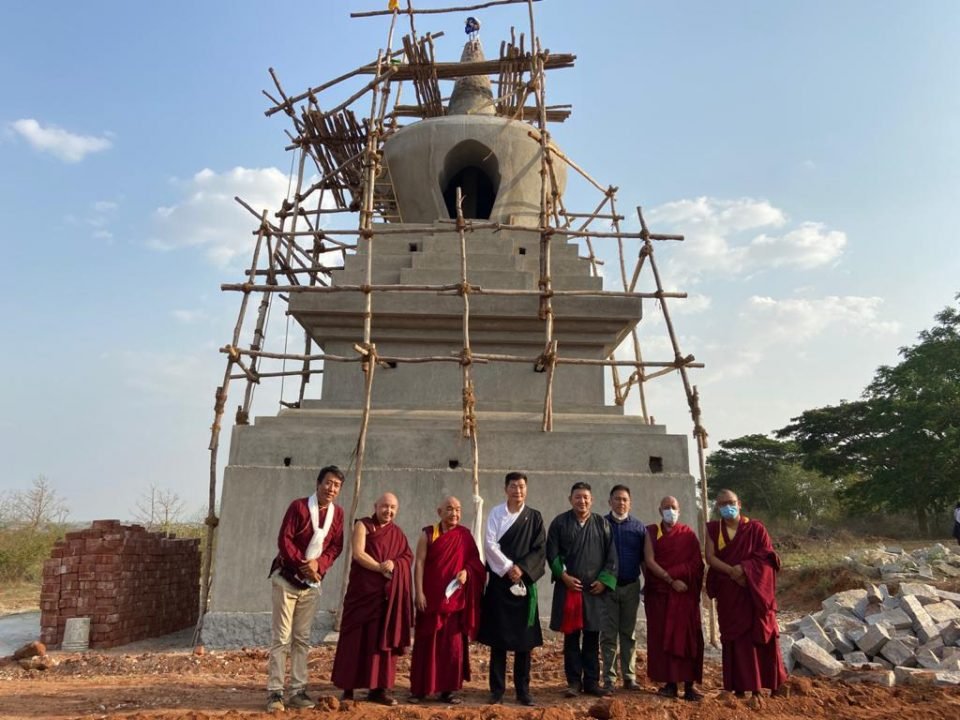
President of Tibet, Sikyong Dr. Lobsang Sangay, with others in front of the stupa being built in Hunsur.
For six years, FPMT Charitable Projects has been supporting Rabgayling Old Aged Home in Hunsur, India, which is part of the Rabagayling Tibetan Settlement and serves twenty elderly residents. Over several years, funds have been offered for daily food for the residents, for the annual operating costs of the elderly home, the building of accommodation for the residents, medical needs, and a community hall. Most recently, a 35-foot stupa has been sponsored near the elderly home on the settlement. This stupa is being built for the all the people in the Tibetan settlement, but in particular for the elders, as it is close to the elderly home and they can circumambulate it without much difficulty. This is an easy way for the elders to collect merit and purify negative karma by going around the hold object. Recently the previous President of Tibet, Sikyong Dr. Lobsang Sangay, visited the stupa.
Advice for Those Who are Dying
Rinpoche has also offered extensive advice for those who are dying or have recently died including how to make the environment very beautiful and uplifting so that people can enjoy and not feel depressed as well as general advice for what thangkas, mantras, prayers, or books are most beneficial.
Please rejoice in the various ways we are offering direct support to elders, such as completely covering or helping with the annual expenses for a number of elderly homes in India, and also how Rinpoche is helping with offering advice for ultimate support, such as inspiring the elders to use their time creating merit and offering advice on how to help at the time of passing.
Lama Zopa Rinpoche offered details about the recent advice he offered to Tibetan elderly in the thought transformation teaching “Some Ways in Which Rinpoche is Benefitting People.”
All are welcome to support the Social Services Fund and help ensure we can offer direct support to the elderly.
- Tagged: advice for death and dying, elderly, elderly homes, hospices, social services fund, tibetan elderly
27
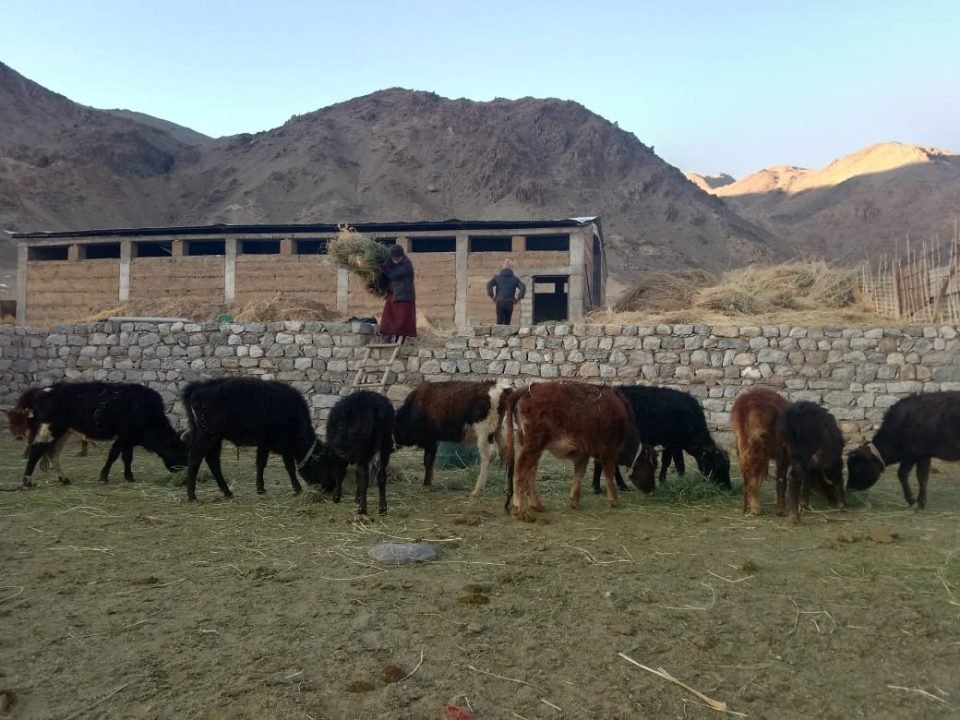
Cows being cared for by Taru Gayphel Tsogspa Animal Welfare Society.
Taru Gayphel Tsogspa Animal Welfare Society is an animal care facility located in Taru, Leh, Ladakh. Tsering Dorjay Malik first developed the idea in 2013 to help the animals in the village by drawing inspiration from Buddha’s teachings that every living being has Buddha nature and is deserving of care and kindness.
In the village, abandoned donkeys, cows, and other farm animals were running around loose, many of whom were victims of road accidents or could not find the necessary resources to survive. Taru Gayphel Tsogspa Animal Welfare Society started by rescuing these animals, offering care, and feeding them. In the beginning there were many challenges due to there not being enough food, shelter, and medicine for the animals. Slowly, concerned animal lovers in the area began supporting this project, but even with this interest, and also due to the increasing numbers of animals needing care, the available resources were exhausted and it was not possible to accept more animals.
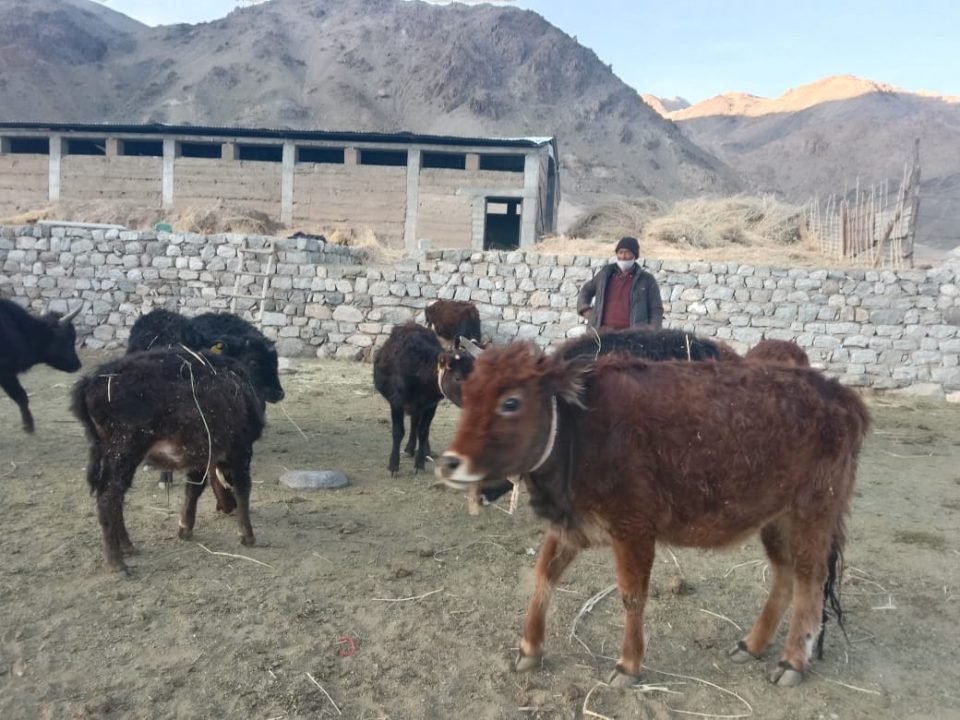
Cows of the Taru Gayphel Tsogspa Animal Welfare Society.
Currently there are fifty bulls, twenty cows, ten sheep, and five donkeys being cared for at Taru Gayphel Tsogspa Animal Welfare Society, many of these animals have been saved from death and now are able to live the rest of their lives for on the land.
Thanks to the kindness of a generous donor, the Animal Liberation Fund recently offered a grant of US$20,000 for the continual care of all the animals at the facility including for food, medicine, and shelter; and for upkeep of the premises. Some of these funds will also be used for essential needs such as:
- Building ten new animal sheds
- Compound walls for the center which is nearly 54,000 square feet
- Staff accommodation on the premises and salaries for four caretakers
- Medical care for sick and injured animals
- Food for all the animals (the total for this alone is US$59,000 a year)
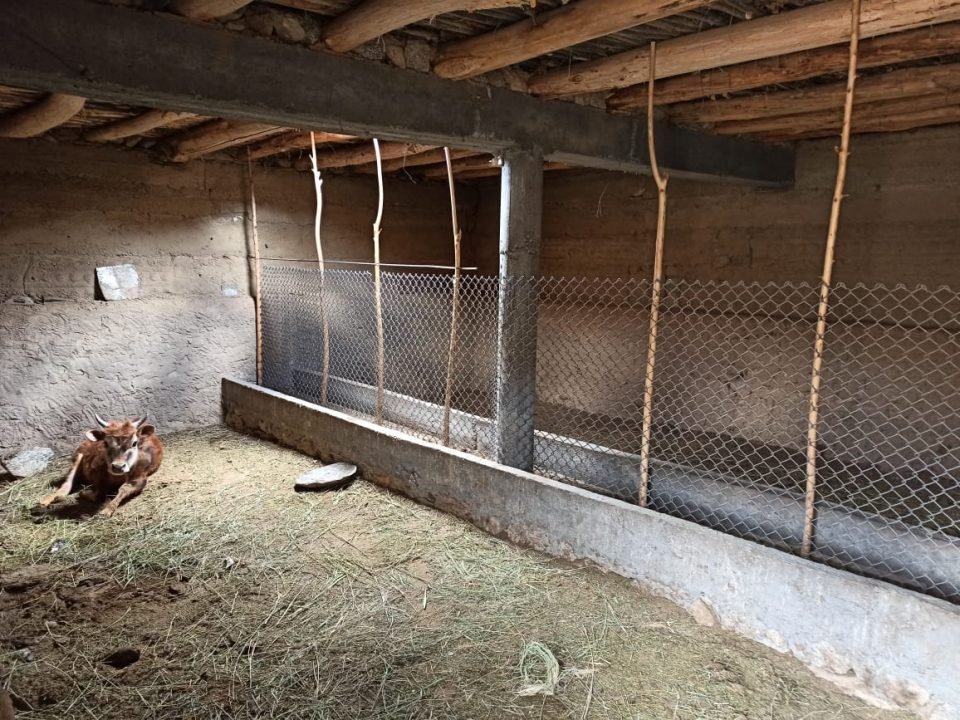
Thank you to all the kind donors of the Animal Liberation Fund and the Stupa Fund who enabled us to make these grants, and benefit over 100 animals.
All are welcome to support the Animal Liberation Fund and Stupa Fund and help ensure beneficial grants like this can continue.
- Tagged: animal care, animal liberation fund, animal rescue, animals, social services fund, stupa fund
20
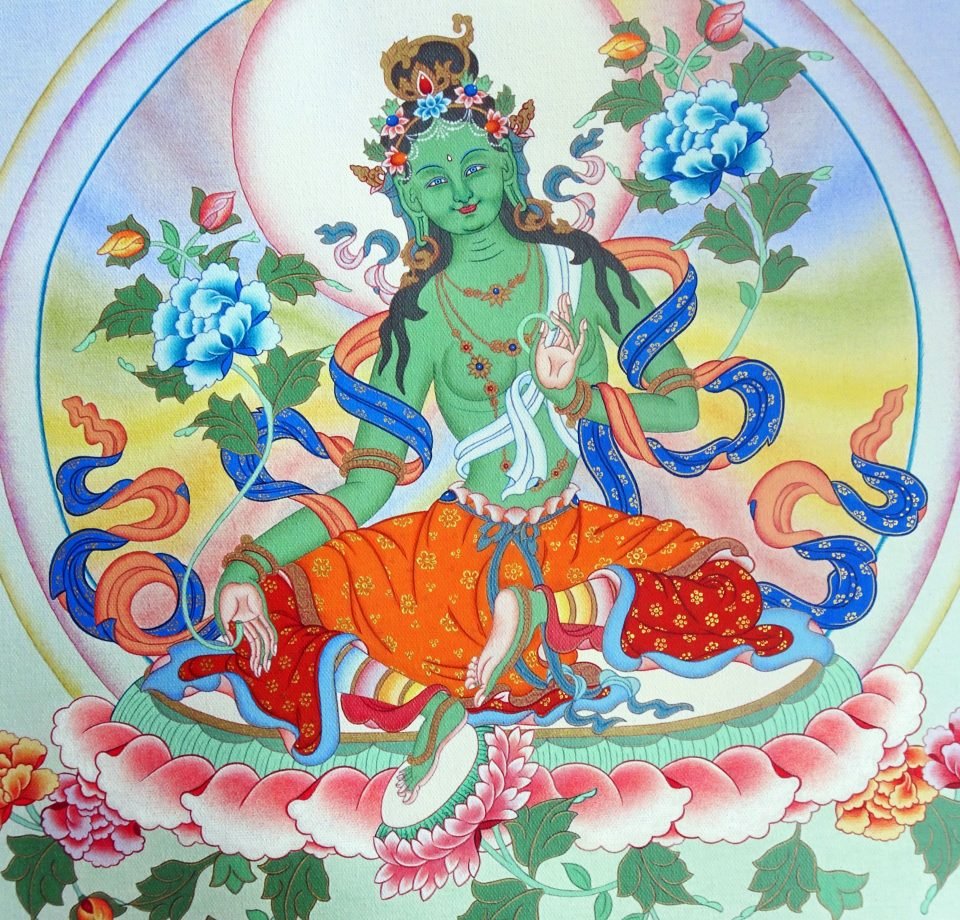
Through the FPMT Puja Fund we have arranged for an incredible vast array of pujas, practices, and offerings for Saka Dawa May 26 when any merit created is multiplied 100 million times.
The pujas and offerings are being undertaken with strong prayers by up to 10,000 Sangha and every practice is extensively dedicated to all the donors of the puja fund, and in particular for all those affected by the pandemic. By contributing any amount to the Puja Fund, not only will you be a part of all these prayers and practices but also every single puja arranged throughout the year, will be dedicated to you.
“If you make offerings, please remember on the actual day that the pujas are happening, rejoice in them and dedicate the merit. This is the best business and the best way to create most extensive merit.” – Lama Zopa Rinpoche
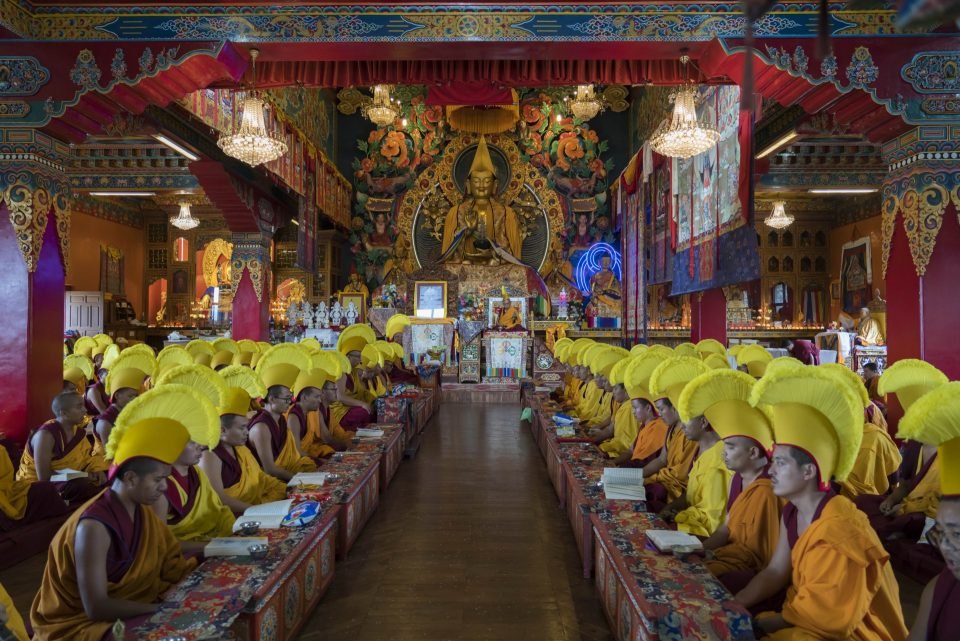
Monks at Kopan Monastery engaging in puja.
Some of the prayers, pujas, and offerings happening on Saka Dawa*:
- Recitation of the Prajnaparamita.
- 100,000 Praises to Twenty-one Taras offered three times by over 9,000 ordained monks and nuns.
- One thousand sets of offerings to Buddha Namgyalma, Namgyalma long life ritual, Medicine Buddha puja and Sixty-four Offerings to Kalarupa.
- One Hundred Million Mani Retreat by Tashi Chime Gatsal Nunnery in Nepal.
- Offerings are made to His Holiness the Dalai Lama and all of Rinpoche’s gurus and to over 10,000 ordained Sangha around the world.
- Offering paint, gold, and new robes to stupas in Nepal, and Buddha statue in BodhGaya and Jowo Buddha statue in Tibet.
-
See the complete list of all the pujas, practices and offerings that will be happening on Saka Dawa.

The nuns of of Kachoe Gyakyil Nunnery, Nepal, offering puja.
Thank you to all the donors who make it possible to arrange these continual pujas, prayers, and offerings.
*We are closely monitoring the most current COVID-19 restrictions and will adjust the practices and pujas offered on Saka Dawa according to the safety of all.
You can learn more about the beneficial prayers, practices, and pujas sponsored by the Puja Fund, or about FPMT’s other extensive charitable activity.
- Tagged: fpmt puja fund, puja fund, saka dawa
14
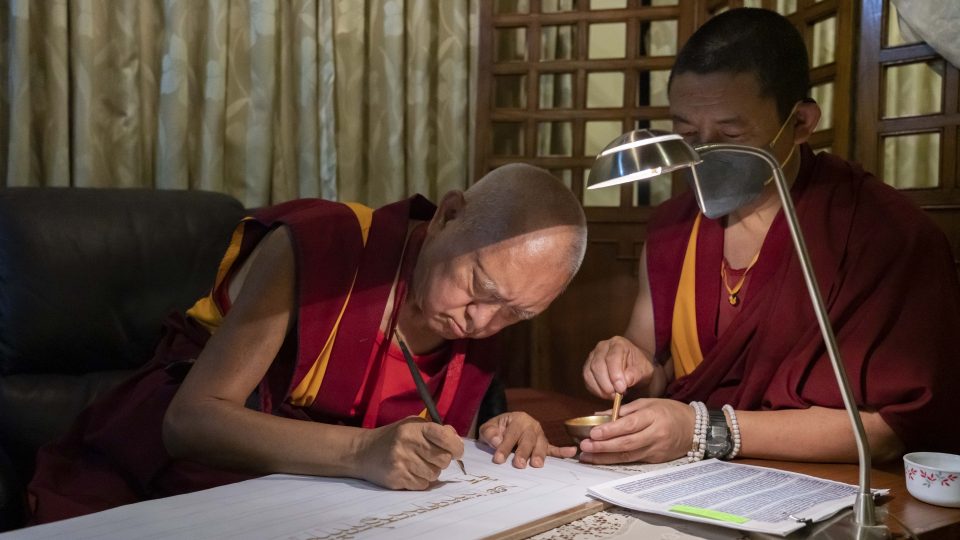
Lama Zopa Rinpoche writing out the Prajnaparamita for the first time in ten years with the help of Ven. Tsering, Nepal. May 2021, photo by Ven. Lobsang Sherab.
Lama Zopa Rinpoche had been writing the 8,000 verse Prajnaparamita Sutra in pure gold for several years, but since 2011 Rinpoche hasn’t been able to write, as Rinpoche felt his handwriting was not stable enough, since manifesting a stroke that year. Rinpoche has explained how important it is to write in one’s best calligraphy, due to the incredibly precious text that one is writing out. Under Rinpoche’s guidance several students have been writing out the Prajnaparamita on archival quality rainbow paper including Ven. Tsering, who is now based at Kopan Monastery, and is writing out volumes from the 12,000 verse Prajnaparamita in pure gold full-time, as well as Jane Seidlitz in US, and Ven. Nina at Khachoe Ghakyil Ling Nunnery.
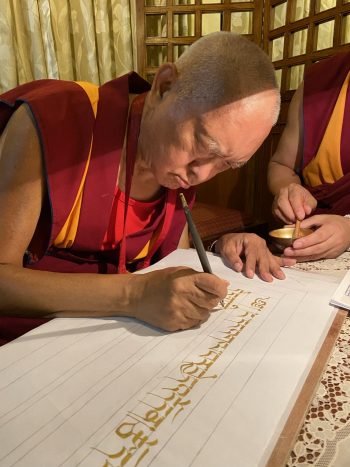
Lama Zopa Rinpoche writing out the Prajnaparamita, Nepal. May 2021, photo by Ven. Lobsang Sherab.
Unbelievably, Rinpoche has started writing out the Prajnaparamita again! Please join us in rejoicing that Rinpoche is able to do this and Ven. Tsering is helping him.
As Rinpoche has explained:
Even writing one letter from Prajnaparamita, even writing one letter, one syllable, the benefits are unbelievable, unbelievable, more than making extensive offerings, skies of extensive offerings to all the buddhas, so many eons, the merits you collect are unbelievable.
Offering one grain of rice or a tiny flower to a picture of the Buddha, statue of the Buddha, small or big, the benefits is that it brings you up to enlightenment and then you are able to free numberless sentient beings from oceans of samsaric sufferings and bring everyone to enlightenment. Just by making skies of offerings to numberless buddhas for eons.
Now here writing one word of Prajnaparamita, the teachings of emptiness, you create far greater merit than making that many offerings, skies of offerings to numberless buddhas for so many eons.
Thank you to all the kind donors of the Prajnaparamita Project, which covers the cost of gold, paper, and calligraphy pens.
You can learn more about the Prajnaparamita Project as well as the other Charitable Projects of FPMT.
- Tagged: prajnaparamita, prajnaparamita project
4
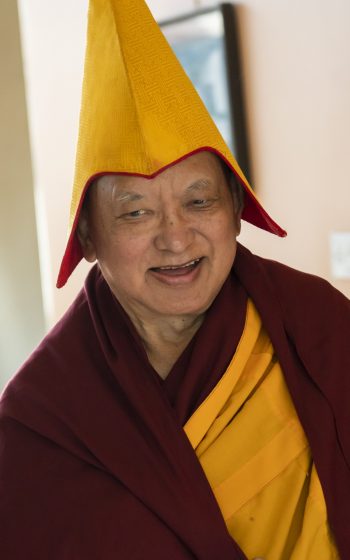
Lama Zopa Rinpoche during the long life puja offered to him on April 19, 2021, at Kopan Monastery. Photo by Ven. Lobsang Sherab.
Please join the entire FPMT community by rejoicing in the recent long life puja which was offered to Lama Zopa Rinpoche at Kopan Monastery, Nepal, on behalf of FPMT centers, projects, services, study groups, and students on April 19.
This was the second of the official annual long life pujas organized in accordance with the advice of Khadro-la (Rangjung Neljorma Khadro Namsel Drönme).
This was a White Tara Long Life Puja and was preceded by seven days of practices led by Khadro-la and Kopan Lama Gyupas and senior monks and nuns.
The long life puja is an important offering ceremony for purifying mistakes that occur in relation to one’s teacher and to creates the causes and conditions to continue to receive benefit from that teacher for a very long time. For this reason, the FPMT organizes at least one official long life puja for Rinpoche every year. Long life practices also create the cause for one’s own long life.
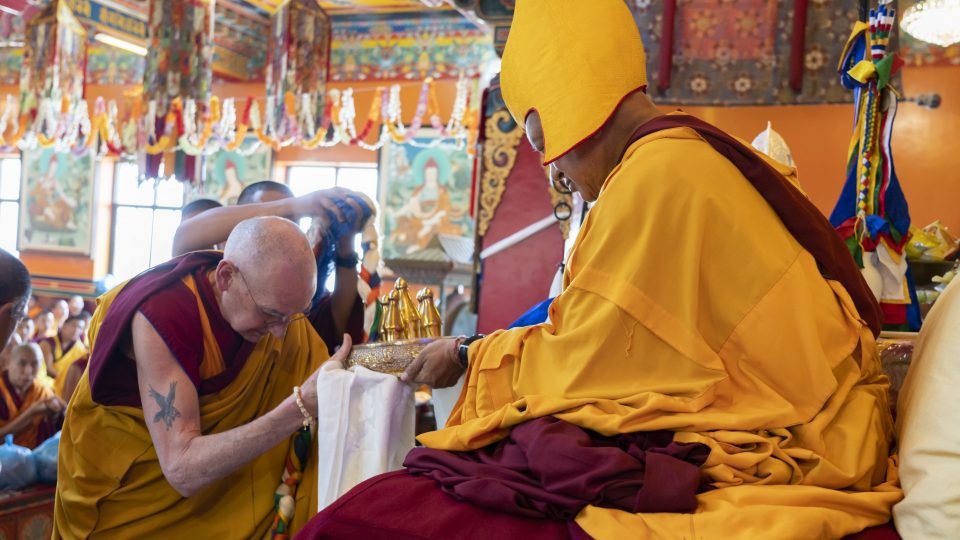
Ven. Roger Kunsang offering a mandala to Lama Zopa Rinpoche during the April 19 long life puja at Kopan Monastery. Photo by Ven. Lobsang Sherab.
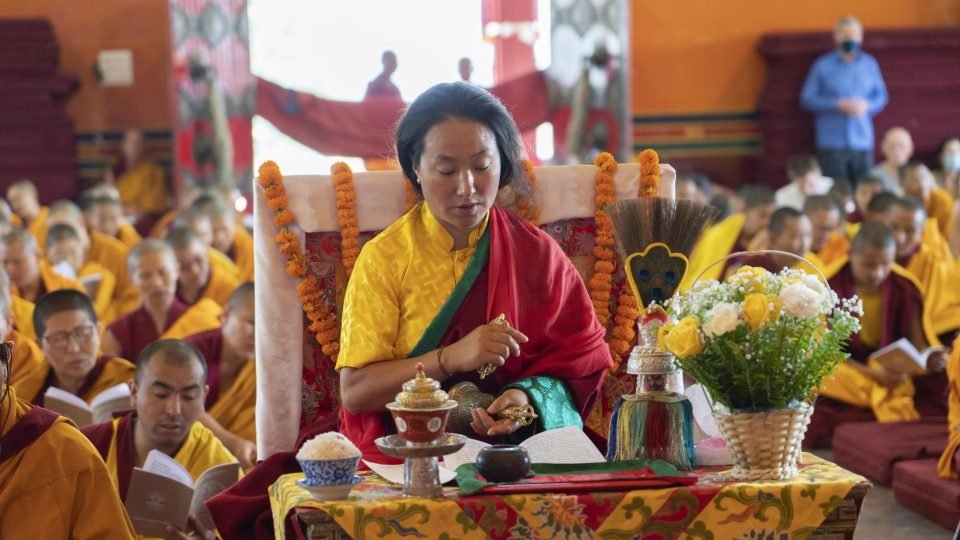
Khadro-la participating in the April 19 long life puja for Lama Zopa Rinpoche at Kopan Monastery. Photo by Ven. Lobsang Sherab.
We are delighted to share this video (youtu.be/c0qhiGPf1do) of Rinpoche from the long life puja on April 19. In this 46 minute clip, Rinpoche is offering advice to all FPMT students and centers in English and thanking those who participated in the long life puja including everyone offering service to FPMT. During this advice and thanks Rinpoche shares the following in honor of Lama Yeshe at 22:42 in this video:
“Who started the organization is Lama Yeshe, most rare and difficult to mention the holy name. He started the organization in Dharamsala, Tushita. I think we did fulfill Lama Yeshe’s wishes. The whole organization from year to year to year, development was so hard. It came up gradually, like an airplane taking off, very slowly—it developed like that. We did fulfill Lama’s wishes, not only studying lamrim but Masters Program, Basic Program, all of that—so we really did fulfill Lama Yeshe’s wishes as an organization. And also by serving His Holiness the Dalai Lama, this is so good, and this is the quality of the organization.”
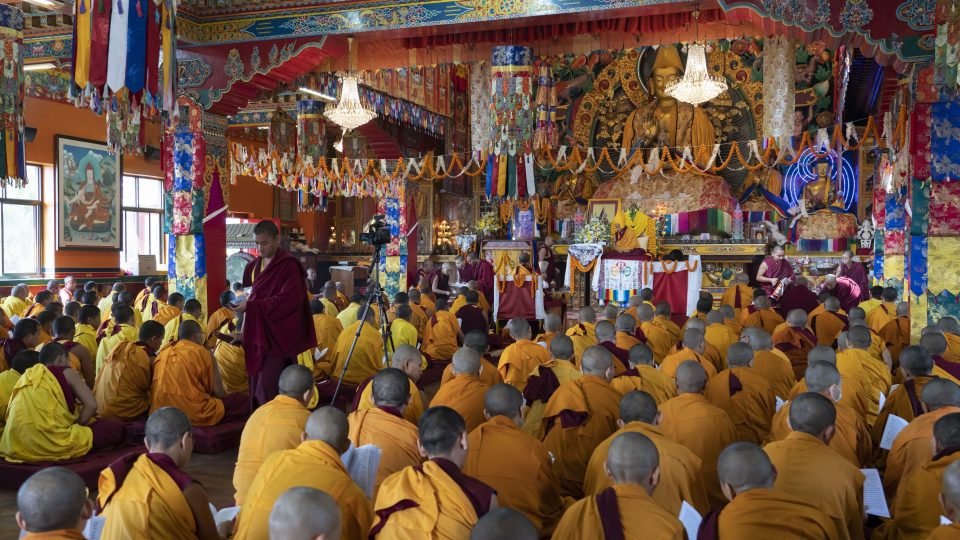
Participants during the long life puja offered to Lama Zopa Rinpoche on April 19 at Kopan Monastery.
We offer thanks to all who contributed to the Long Life Puja Fund, those who offered prayers at the time of the puja, and those who rejoiced that this puja has happened—all of this collective good energy and intention contributes to creating the cause for Lama Zopa Rinpoche to be among us for a long time.
“To understand why a long life puja is essential, we must understand the value of the Guru. He is our guide in this life, the bardo, and future lives. He is immensely important. It is not a case where if we ask him to live he will, and vice-versa, but that to offer such a ceremony purifies our own broken samayas.” —Geshe Lama Konchog
You can see more photos of this special White Tara Long Life Puja in the most recent photo gallery of Lama Zopa Rinpoche’s activities:
fpmt.org/teachers/zopa/gallery/nepal-march-april-2021
The Long Life Puja Fund always contributes to long life pujas offered to Lama Zopa Rinpoche. You can also learn about the many Charitable Projects of FPMT and discover the many ways the various funds and projects are benefiting others.
- Tagged: kopan monastery, lama zopa rinpoche long life puja, lama zopa rinpoche long life puja fund, long life puja
23
Important Update on the Maitreya Project in Bodhgaya
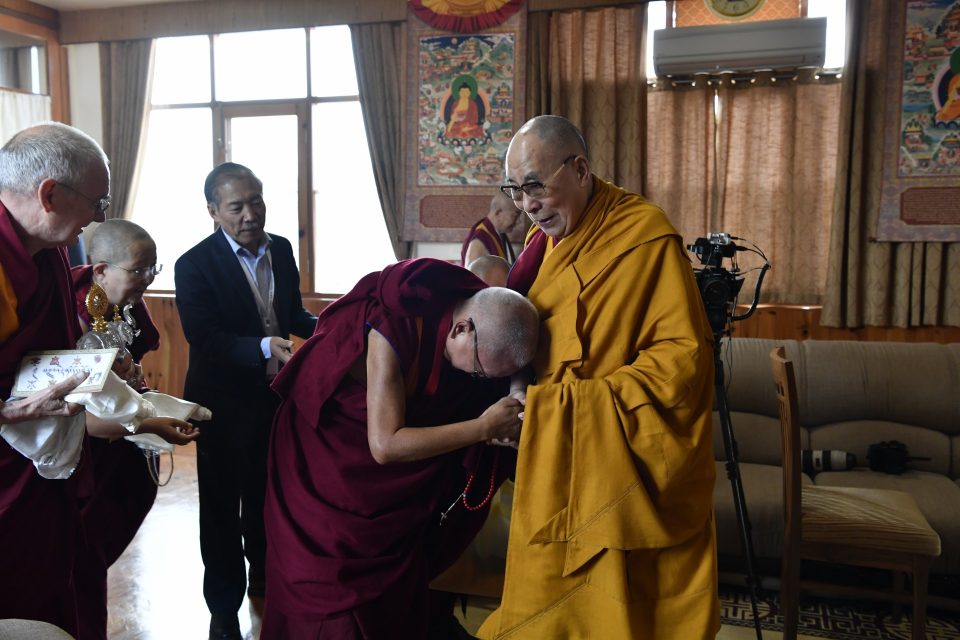
Lama Zopa Rinpoche meeting His Holiness the Dalai Lama in Bodhgaya, January 2020. Photo courtesy of the Office of His Holiness the Dalai Lama.
The creation of Holy Objects for World Peace is an important aspect of Lama Zopa Rinpoche’s vast vision for the FPMT organization. Specifically, Rinpoche envisions the creation of many statues of Maitreya Buddha around the world. Currently, there are two separate FPMT projects to build very large Maitreya Buddha statues in India. One based is in Bodhgaya, Bihar, and one based in Kushinagar, Uttar Pradesh.
Ven. Roger Kunsang’s CEO letter for this year’s Annual Review was a concise overview of a challenging yet beneficial year for FPMT International Office and the whole FPMT organization. In this letter he shared an important update about the Maitreya Project land in Bodhgaya. We are pleased to share this update with you.
Another major highlight for 2020 is that Lama Zopa Rinpoche could finalize the offering of the Maitreya Project land in Bodhgaya to His Holiness the Dalai Lama. This is an amazing offering and an incredible achievement for the organization that we can all rejoice in!
The donation of about thirty acres (twelve hectares) of valuable, prime land in Bodhgaya will help fulfill His Holiness’s wish to build an international institute in this most sacred place of Buddhism. His Holiness’s vision is that the institute will share the wisdom of the Nalanda tradition in order to create happiness and peace in the world. The project includes three aspects:
- To create a learning center for studying philosophy of the mind; emotional health; as well as methodology, etymology dialects, and meditation as embodied by Nalanda masters.
- To build a replica of the ancient Nalanda University to connect with Buddhists around the world and bring the world into the “ecosystem” of Bodhgaya.
- To promote the four principal commitments of His Holiness the Dalai Lama, inspired by the Nalanda tradition.
The plan to build a large Maitreya statue at this site has been integrated into the overall vision for His Holiness’s institute. FPMT will continue to sponsor the statue.
Sikyong Lobsang Sangay, the president of the Tibetan government in exile, wrote to me recently, thanking FPMT for the offering of the Maitreya Project land:
“I would like to sincerely express my gratitude to FPMT for offering land to His Holiness the Dalai Lama through the Nalanda Institute of Dalai Lama at Bodhgaya. The institute, as envisioned by His Holiness, will be a secular international institution that will preserve and promote India’s ancient wisdom that flourished at Nalanda University.
“The land offered by FPMT to His Holiness will be specifically used by the institute to provide an opportunity for people from around the world to study His Holiness’s philosophy and vision. The land will host seven core structures, which are the Maitreya statue, a temple, a museum, an international Buddhist library, a meditation center, classrooms, and a state of the art convention hall.”
In January 2020, Rinpoche had an appointment with His Holiness seeking advice on other matters. During the meeting, His Holiness expressed gratitude for the offered land and also for the role Lama Yeshe and Lama Zopa Rinpoche have played in establishing the Gelug tradition in the West. His Holiness also praised Rinpoche’s generosity and other qualities as well as the work of the FPMT organization.
What Rinpoche has offered to His Holiness is something that helps to actualize a strong wish of His Holiness. As Rinpoche has taught, fulfilling the wishes of the guru is the most enjoyable thing in life. When Rinpoche told Khadro-la (Rangjung Neljorma Khadro Namsel Drönme) about the donation, she said that offering land to His Holiness for the institute is far more beneficial than building thousands of Maitreya statues. (Of course, we are still going to build Maitreya statues.)
So please rejoice in the merit created by the donation of Maitreya Project land to His Holiness. And also rejoice in the merit generated by all those who have helped with and donated to the Maitreya Project in Bodhgaya over the years. This generosity has created the conditions for Rinpoche’s amazing offering to His Holiness—all of this fulfilling the wishes of our gurus!
You can read Ven. Roger’s full CEO letter in this year’s Annual Review which includes many important and inspiring updates from 2020.
You can read about the many beneficial grants offered through the various funds of FPMT Charitable Projects in this year’s Annual Review.
If you would like to contribute to the building of holy objects around the world, you are welcome to offer any amount to the Holy Objects Fund which contributes to the creation of stupas, prayer wheels, and statues.
- Tagged: bodhgaya, holy object fund, maitreya buddha project, maitreya buddha project bodhgaya, maitreya project trust, maitreya projects
20
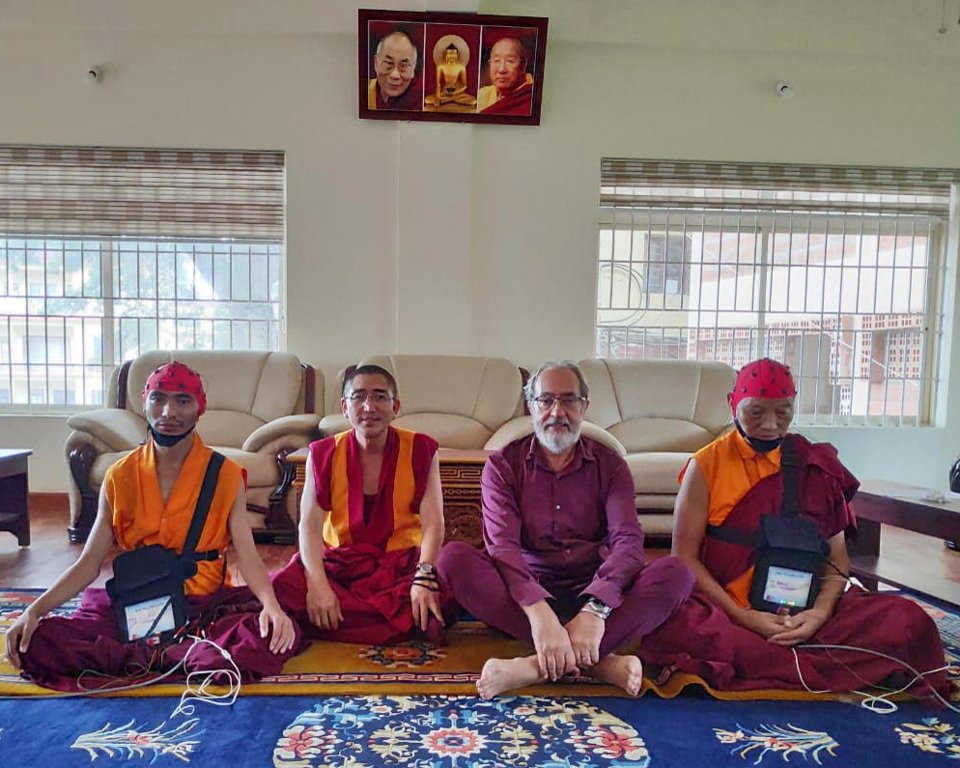
Monks from Sera Je Monastic University and University of Pisa Professor Bruno Neri are part of a collaborative research effort on meditation, which is connected to the work of Istituto Lama Tzong Khapa’s Mind Science Academy, Sera Je Monastery, India, 2019. Photo courtesy of Mind Science Academy.
When His Holiness the Dalai Lama visited Istituto Lama Tzong Khapa (ILTK) in 2014 he advised the FPMT center located in Pomaia, Italy, to create an academy focused on Buddhist mind science. Established in 1977, ILTK already had many successful Buddhist education programs. What His Holiness had in mind, however, involved the creation of a center of study where Buddhist knowledge was integrated with secular academic programs, thereby making ancient Buddhist wisdom available more broadly.
This vision has led to ILTK’s Mind Science Academy project. Our FPMT Education and Preservation Fund has been very happy to be able to support this important work and has contributed US$140,900 to the project to date. Filippo Scianna, the former director of ILTK who is currently overseeing the project, recently updated FPMT International Office on its progress.
In his report, Filippo shared four key points that inform the project. First, there is a lot of interest in the intersection of Buddhist mind science and Western science. This has been demonstrated by high levels of attendance for programs on this topic. Also, students appreciate and value academic accreditation, which is central to the Mind Science Academy plan. In addition, dialogues with university scholars lead to continued debate, research, and mutual enrichment. Finally, project organizers observe that when they establish relationships with the academic world they create paths to Buddhist philosophical study for people who might not otherwise be interested.
As part of the Mind Science Academy project, ILTK is collaborating with several universities in Italy. Since early 2016, ILTK has been working with the University of Pisa to create a Master’s program in neuroscience, mindfulness, and contemplative practice. Several cohorts have completed the program. Unfortunately, for 2020, the program had to be cancelled due to the pandemic. But in 2021, they have arranged for courses to be online and have seen more registrations than anticipated. ILTK staff are involved as teachers for the program. Many of the approximately 200 students who have done the program have shown an interested in more serious Buddhist study.
Also in 2021, a new specialized course has been created on the application of meditation practices in organizational contexts. The course, also offered through the University of Pisa, has a high level of registration for it. The project plans to have a summer school through the University of Pisa as well, which will be organized by ILTK. The summer school is attracting a lot of interest, including from students across several continents, and hopefully the pandemic will not prevent it from happening.
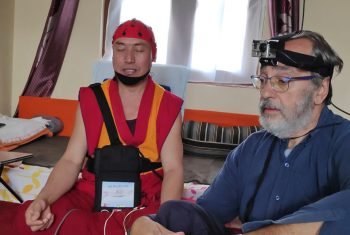
A Sera Je monk wearing equipment to monitor brain activity with Prof. Bruno Neri, part of a Sera Je Monastic University, India, and University of Pisa, Italy, partnership, 2019. Photo courtesy of the Mind Science Academy.
The Mind Science Academy project has also established relationships with the University of Florence and the University of Bologna. With the University of Florence, they have plans to do a course in the spring of 2022 that will include a Buddhist philosophical exploration of emotional functioning with practical applications for psychologists and health workers. At the University of Bologna, a collaboration is being developed that will include as a focus the use of meditation as a therapeutic support in hospitals and universities.
At ILTK itself, a new course has started that relates closely to the work of the Mind Science Academy. The three-year course covers the study of logic and debate, and how these methods of discerning truth relate to pedagogy and knowledge. More than a hundred people have enrolled in it.
Also, ILTK is organizing a conference for June 2021 entitled “Reality Is Not as It Appears.” Geshe Namdak, the resident geshe at Jamyang Buddhist Centre in London, UK, will attend as will several university professors. New research on meditation conducted by the University of Pisa in collaboration with Sera Je Monastic University in India will also be presented at the conference.
Filippo writes that collaborating with the universities overall has been a good experience and has already given many people in the academic world access to Buddhist principles and teachings. He also sees potential for other FPMT centers to develop programs involving universities in their local areas and wants to share the information he’s learned as part of working on this project. We’ll be exploring this in more detail in future Mandala stories.
For more information on the Mind Science Academy and Istituto Lama Tzong Khapa, please visit their website (www.ILTK.org).
Learn more about the FPMT Education and Preservation Fund.
Read archive Mandala stories on the Mind Science Academy: “Building A Bridge: The Academy of Mind Science and Valid Cognition at Istituto Lama Tzong Khapa” and “Ancient Indian Wisdom for the Modern World.”
- Tagged: Education and Preservation Fund, filippo scianna, istituto lama tzong khapa, mind science academy
14
Long Life Puja Offering to Lama Zopa Rinpoche: April 19!
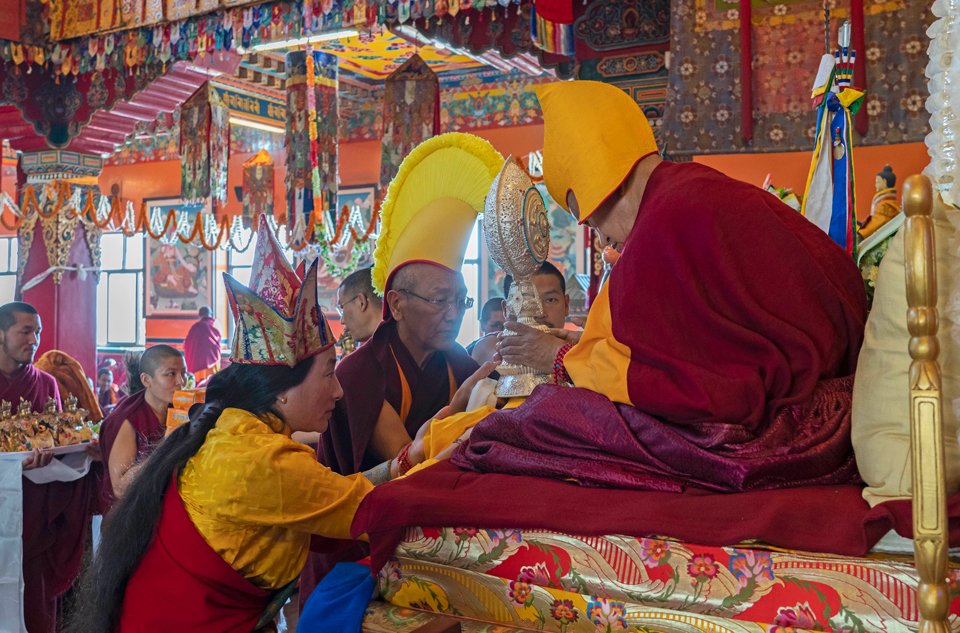
Khadro-la and Khen Rinpoche Geshe Chonyi offering a dharmachakra to Lama Zopa Rinpoche, during a long life puja for Rinpoche, Kopan Monastery, December 2020. Photo by Ven. Lobsang Sherab.
Please rejoice that we have the opportunity to offer the second official long life puja for Lama Zopa Rinpoche. This puja will be offered on behalf of FPMT centers, projects, services, study groups, and students at Kopan Monastery, Nepal, on April 19.
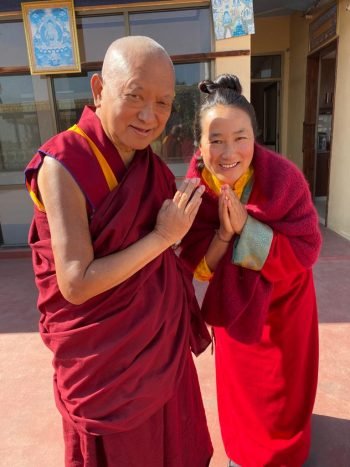
Lama Zopa Rinpoche and Khadro-la on the December 25 long life puja offered to Lama Zopa Rinpoche. Photo by Ven. Roger Kunsang.
This is the second of the long life pujas organized in accordance with the advice of Khadro-la, Rangjung Neljorma Khadro Namsel Dronme.
This second long life puja will be another White Tara Long Life Puja, which will be preceded by seven days of practices, led by Khadro-la. Khadro-la began these preparations on April 12 at Kopan Monastery with the senior monks and Lama Gyupas. These seven days of practices are done in order to make the long life puja as powerful as possible. Each day sessions of White Tara practice are offered and many recitations of White Tara and Tara mantras are recited to eliminate obstacles to Rinpoche’s long life.
They also are reciting a special mantra that combines the White Tara mantra with Lama Zopa Rinpoche’s name mantra:
OM TARE TUTTARE TURE OM AH GURU VAJRADHARA MUNI SHASANA KSHANTI SARVA SIDDHI AYUR PUNYE JNANA PUSHTIM KURU SVAHA
Please enjoy this short video of highlights from the first long life puja offered in December 2020:
https://youtu.be/-juSPvEPU3g
The purpose of the long life puja is for students to purify the mistakes that occur in relation to their teacher, and to create the causes and conditions to continue to receive benefit from that teacher for a very long time.
By maintaining harmony, following Rinpoche’s advice, and offering long life pujas, FPMT students are generating the merit needed for our precious guru will stay in the world with us for a long time. Rinpoche also regularly mentions that offering long life pujas is a cause for one’s own long life.
All are welcome to participate in this auspicious event by offering prayers from your heart on the day of the puja and also the seven days prior, or you are also welcome to offer any amount toward the puja.
The Long Life Puja Fund always contributes to long life pujas offered to Lama Zopa Rinpoche. You can also learn about the many Charitable Projects of FPMT and discover the many ways the various funds and projects are benefiting others.
9
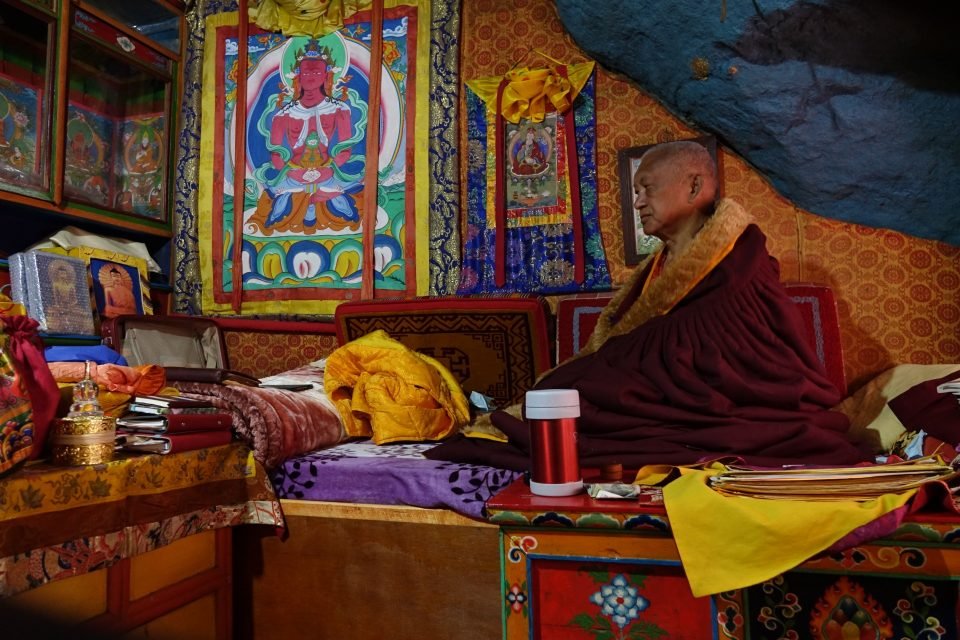
Lama Zopa Rinpoche in Lawudo cave, 2015. Photo by Ven. Roger Kunsang.
The Lawudo Retreat Centre, situated high in the Himalayan mountains of eastern Nepal, holds particular significance for FPMT. Lama Zopa Rinpoche is the reincarnation of the Lawudo Lama, Lama Kunzang Yeshe, who lived and practiced in Lawudo until his passing at age 81.
Lawudo is a greatly blessed place of holy beings and called the Magnificent Cave of Attainments. This refers to a stomach-shaped cave, known to the locals as Lawudo. The Lawudo Lama went to this place and dug out the earth to find the beautifully shaped cave with various auspicious signs. The Lawudo Lama declared that it was a self-created cave given to him by Padmasambhava himself and such a cave was mentioned in a very secret terma (text) of Padmasambhava.
The Lawudo Lama spent thirteen years on one seat inside the cave, without going anywhere, meditating day and night with great energy. He also gave transmissions, commentaries and long-life initiations to his disciples from Khumbu. The Lawudo Lama predicted the exact day of his passing and passed away in meditation inside the cave.
The Lawudo cave still has the relics stupa inside and the purkhang (cremation stupa of the Lawudo Lama) is a ten minute walk from the cave.
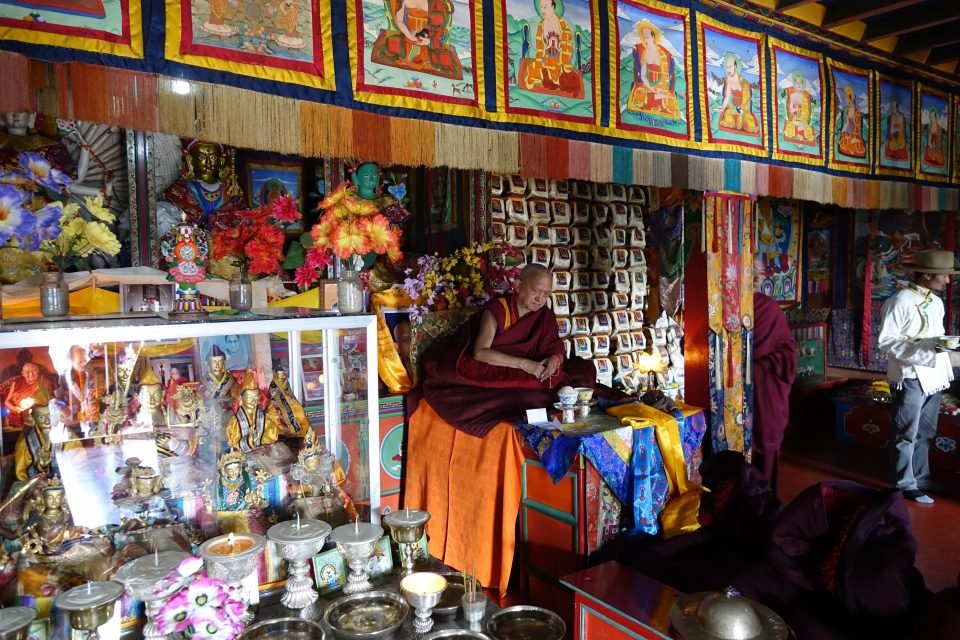
Lama Zopa Rinpoche in the Lawudo gompa, 2015. Photo by Ven. Roger Kunsang.
In this life, Lama Zopa Rinpoche has done several retreats in the cave and often refers to his time there as a very special experience. His book, The Door To Satisfaction, was conceptualized while he was in Lawudo to oversee the building of the gompa. His plan was to build a monastery where Sherpa boys could get a traditional monastic education. However, this plan changed when it became clear that it was untenable to ferry large groups of young monks between Kopan and Lawudo. So now it is a precious hermitage for those who want to do retreat and stay in isolation.
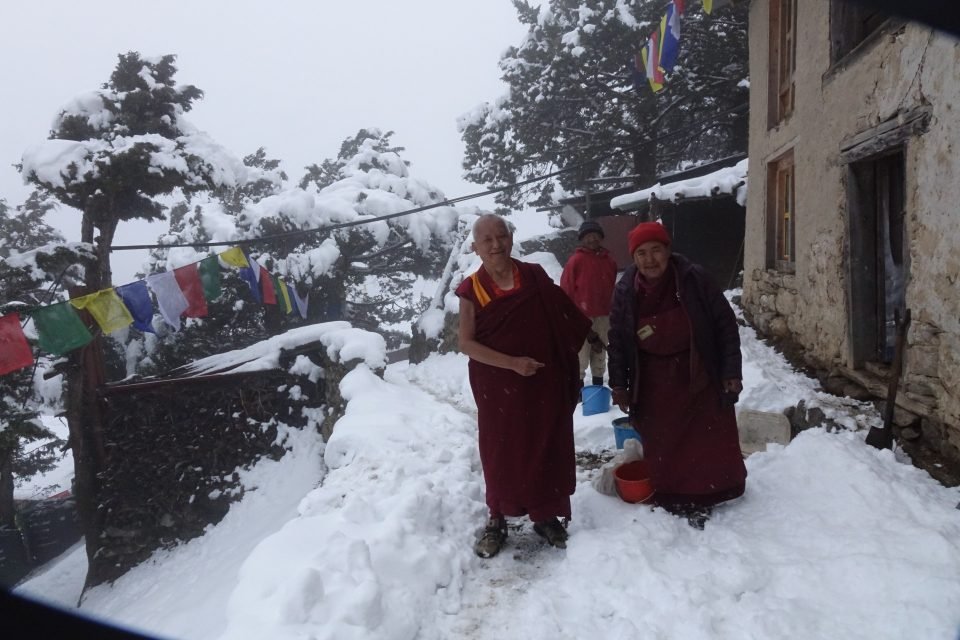
Lama Zopa Rinpoche with his sister, Ani Ngawang Samten, at Lawudo Retreat Centre, 2016. Photo by Ven. Roger Kunsang.
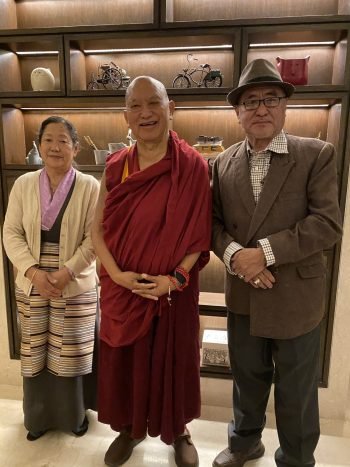
Lama Zopa Rinpoche and his brother Sangay and Sangay’s wife, Nyima. March 2021, Kathmanu, Nepal. Photo by Ven. Roger Kunsang.
Rinpoche’s older sister Ani Ngawang Samten, has overseen all of the development at Lawudo and has taken care of the students, teachers and retreaters who have visited Lawudo since the early days of FPMT. Back then, she carried stones and helped build the gompa at Lawudo. For four decades, she has cooked the food and made sure that visitors have what they need. Ven. Roger Kunsang, CEO of FPMT Inc. and Rinpoche’s assistant, has called her the “mother” of Lawudo. Lama Zopa Rinpoche’s brother, Sangay Sherpa, is the current director and has been working hard in maintaining and also developing Lawudo Retreat Centre.
Sangay reported in a recent update, “In my last visit to Lawudo I rebuilt the previous Lawudo Lama Kunzang Yeshe’s, memorial stupa, which was totally damaged by the earthquake. Also, I have widened the space of the Lawudo cave. I built a concrete support wall behind the main monastery. All the ground work has been finished but the concrete work (stone work, iron, beam pillar work) are still remaining.”
From the most recent Lawudo newsletter (with thanks to Frances Howland):
On October 16, 2020 the 86 year-old Tengboche Rinpoche passed away in Namche Bazaar. Many Sherpas from Kathmandu traveled to Khumbu for the 49 days of rituals and shortly afterward news of some people dying of respiratory illness in Khumbu appeared. Medics arrived by helicopter on October 23 to take swab samples of contact traced locals after a 65-year-old man, who was helicoptered to Kathmandu, tested positive and subsequently died. Following this, the Khumbu rural municipality decided to shut down the Everest region for outsiders.
However, since October the number of cases in Nepal has dramatically reduced. The first tranche of vaccines has just arrived, and health and other frontline workers have begun to be vaccinated.
During these past quiet months the cave has been re-decorated, a new entrance gate has been installed, and two big greenhouses are under construction, which will enable the Lawudo family to grow vegetables all year round. This will be especially useful as a food supplement in the winter.
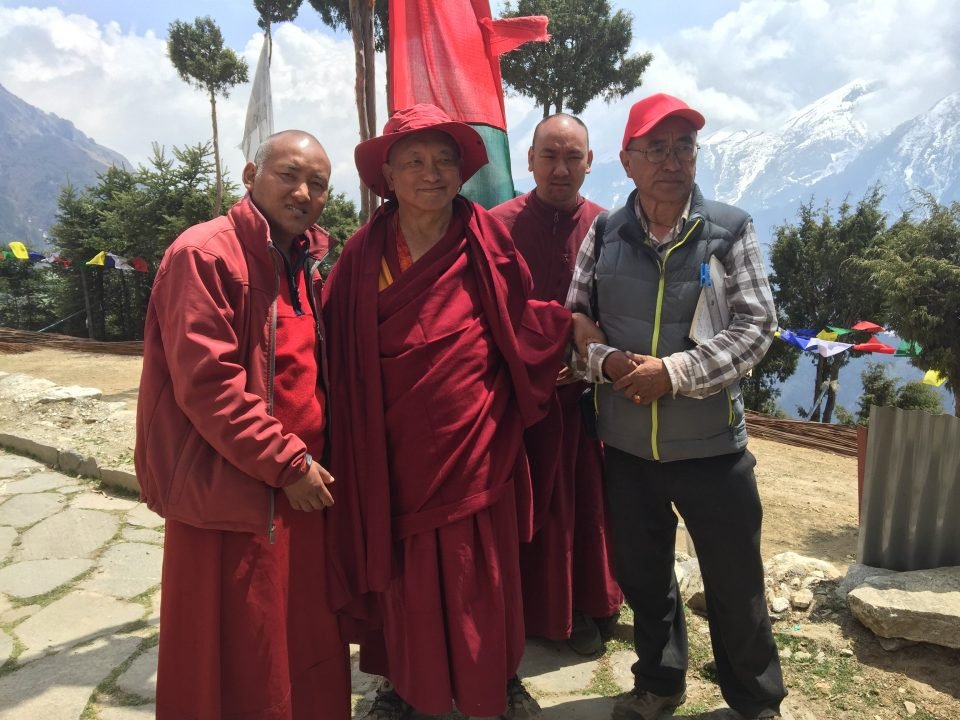
Lama Zopa Rinpoche with his brother, Sangay Sherpa, at Lawudo, 2015. Photo by Ven. Roger Kunsang.
Recently through the Lama Zopa Rinpoche Bodhichitta Fund, Lama Zopa Rinpoche offered substantial support for the work that Sangay is undertaking for the buildings and renovations at Lawudo, as well as for the repairs for the stupa.
Rinpoche still has incredible plans for Lawudo such as building a seven foot Kalachakra statue that will be housed in a small temple that people can circumambulate. Rinpoche also wants to build a Zandog Palri, which is a three-dimensional building based on the Pure Land of Guru Rinpoche. These projects are slowly being worked on and we will update as they progress.
Thank you to Sangay Sherpa and Ani. Ngawang Samten, who have tirelessly worked at Lawudo Retreat Centre. Thanks are also offered to all who support Lawudo Retreat Centre in many ways, past, present, and future.
Lama Zopa Rinpoche Bodhichitta Fund enables Rinpoche’s compassionate service to others to flourish. All the offerings from the fund are used toward the creation of holy objects and extensive offerings around the world; sponsoring young tulkus, high lamas and Sangha in India, Nepal, Tibet and the West; supporting FPMT centers, projects and services; sponsoring Dharma retreats and events; funding animal liberations and blessings, and many other worthy projects.
You can learn more about Lawudo Gompa and its history:
https://lawudo.com/
31
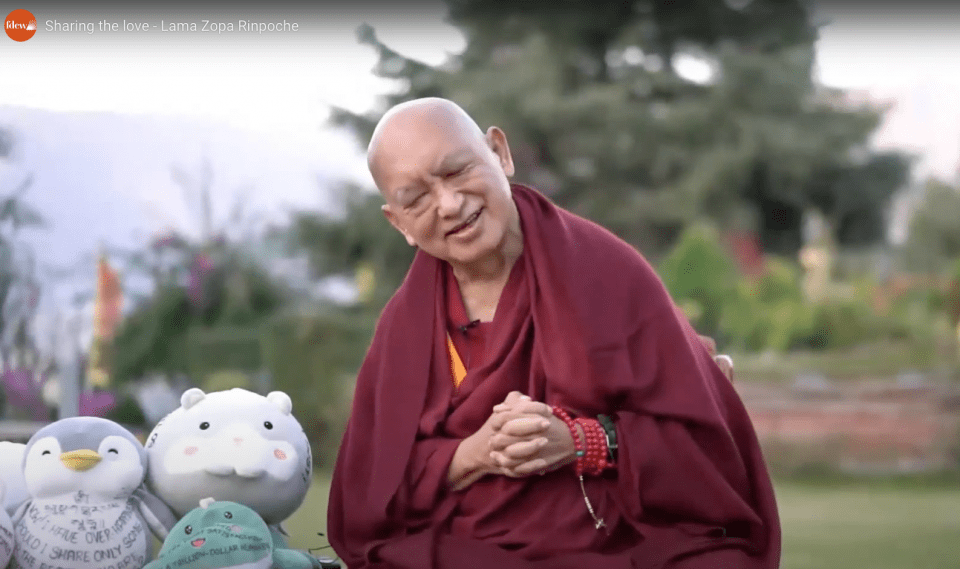
Screenshot of Lama Zopa Rinpoche speaking during the online Big Love Festival, 2020.
In 1983 Lama Yeshe began formulating the idea of Universal Education: “The world needs a new system of education because the old one is too dated for the intelligent people of today and produces a great deal of conflict and dissatisfaction in the present generation. We have to get rid of people’s old concepts and give them a new imagination; a new, broad way of looking at themselves and the world. That’s what I mean by ‘universal.’”
The Foundation for Developing Compassion and Wisdom (FDCW) was established under these principles as a global charity based in London in 2005. Since then FDCW has provided secular training, programs, and resources across many sectors of society—schools, universities, hospices, workplaces, healthcare, youth groups, and community centers. Lama Zopa Rinpoche, FDCW’s Honorary President, continues to support Lama Yeshe’s vision.
You can watch Lama Zopa Rinpoche discussing “What is Universal Education” during the 2020 Big Love Festival:
https://youtu.be/XaAN7Qq9mTs
Courses have reached thousands of people across the world through a growing network of facilitators in more than twenty countries.
The Education and Preservation Fund offered a grant to FDCW toward the operating costs for the year. We were delighted to support their work and invest in the legacy of Lama Yeshe’s wish for Universal Education, which is also one of the Five Pillars of Service within the FPMT organization: (Dharma, Universal Education for Compassion and Wisdom, Social and/or community service, Interfaith activities, Revenue generation activities).
Here are some highlights of what FDCW was able to accomplish with the help of this grant in 2020:
- All courses and programs were converted to online delivery as well as in-person delivery.
- Training was offered to facilitators on how to deliver effectively online.
- Twenty online courses and trainings were delivered plus a 16 Guidelines course that was offered online to twenty young women in Nepal.
- 16 Guidelines for Life book is available now as an e-book in Spanish and English from the FDCW website.
- Free online sessions called “Coming Together” provided community support during the pandemic.
- Seven online Forums for our Facilitators were delivered for peer to peer learning and continued professional development.
- Twenty-seven facilitators were trained to deliver the new Unlocking Your Potential course.
- The Big Love Festival was held online this year due to COVID-19 restrictions. All the recordings of talks now available for free via our website (https://www.compassionandwisdom.org/sharing-the-love).

Plans for 2021 include:
- Development commenced on a new series of courses to train people in Universal Education values and facilitation skills in areas including neuroscience, group facilitation skills, and course adaptation. The first course is Discovering the Wisdom of Neuroscience, which launched in February 2021 with fifty participants worldwide (see poster) for people with a general interest in neuroscience and those who want to develop their experience and knowledge in this area to better support others.
- Offering free resources and webinars on the FDCW website.
- Exploring new ways of delivering courses online and working on a new online learning platform to make our courses truly universally and globally accessible.
- Building a global community based on Universal Education and universal ethical values and enabling local connections and groups to emerge. To achieve this, FDCW is working on an interactive map of FDCW facilitators and Universal Education ambassadors; developing a range of free resources to support local UE groups; and planning the next online summit for November 2021, building on the success of the Big Love Festival.
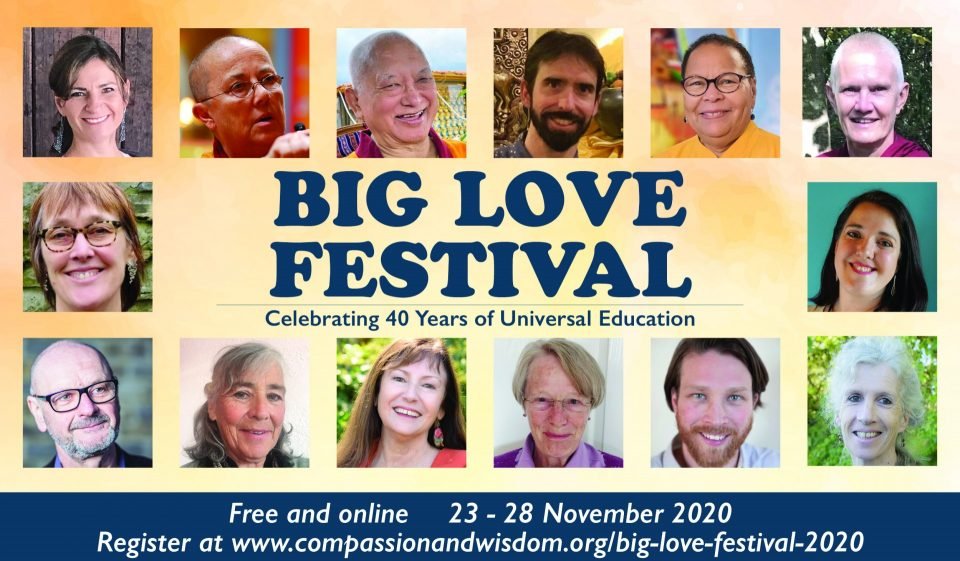
Big Love Festival 2020
Victoria Coleman, Executive Director of FDCW, shares the story of the Big Love Festival, November 2020:
When we at FDCW first began discussing the idea of a global online summit during summer 2020, I had serious doubts. It seemed such a huge stretch for our tiny team, but I felt inspired by Lama Yeshe, the founder of Universal Education. He always thought big! And so the idea for the Big Love Festival was born.
Lama Yeshe first spoke about Universal Education nearly forty years ago, and our vision for the festival was to celebrate what had been achieved since then. We wanted to include speakers who knew Lama Yeshe and also those who had been inspired to breathe Universal Education into life.
As soon as we reached out, we were encouraged by the initial response and support we received and soon the confirmed list of speakers began to grow. Our honorary president Lama Zopa Rinpoche agreed to offer the opening talk on “What is Universal Education?” and Tenzin Ösel Hita, Professor Jan Willis, and Ven. Robina Courtin kindly accepted our invitation to speak.
Just a few weeks before the start of the festival, we received a message of support from our patron, His Holiness the Dalai Lama, who said, “I offer my good wishes to you all on the occasion of the Big Love Festival celebrating forty years of effort in the area of Universal Education by the Foundation for Developing Compassion and Wisdom.” We felt elated to be able to share his encouraging words. It felt like a rocket boost of positive energy.
When the festival arrived, I was immediately blown away by the number of people who joined the sessions both live on Zoom and via our Facebook livestream. The most popular sessions reached over a thousand live viewers worldwide! The broad range of topics presented by the speakers truly captured Lama Yeshe’s big and bold vision for Universal Education.
I felt very moved by the heart, quality, and courage that all speakers brought to their talks. I found it so inspiring. As one participant said, “The warmth and energy of the sessions was palpable.” Although each presenter approached Universal Education from their own perspective and experience, common threads shone through—sincerity, the desire to share, vulnerability, and mental clarity. It truly felt like Big Love.
Looking back, the Big Love Festival radiated positive energy that seemed to build in resonance as the week unfolded. We would like to thank all the speakers and the facilitators who moderated the sessions. Without their support the Big Love Festival would not have been possible. A very special note of thanks goes to all the translators who approached us when they heard about the festival and made it possible to offer translations into French, Italian, Spanish, Portuguese, Russian, and Chinese for many of the talks.
We are committed to making this an annual event and have already started planning the 2021.
For a full list of Big Love Festival speakers as well as recordings of all thirteen talks, visit:
www.compassionandwisdom.org/sharing-the-love
The Education and Preservation Fund supports Dharma study and contributes to the development of Buddhist education programs and the preservation of the Dharma through the publication of Dharma practice materials and translations.
- Tagged: big love festival, Education and Preservation Fund, five pillars, foundation for developing compassion and wisdom, universal education
18
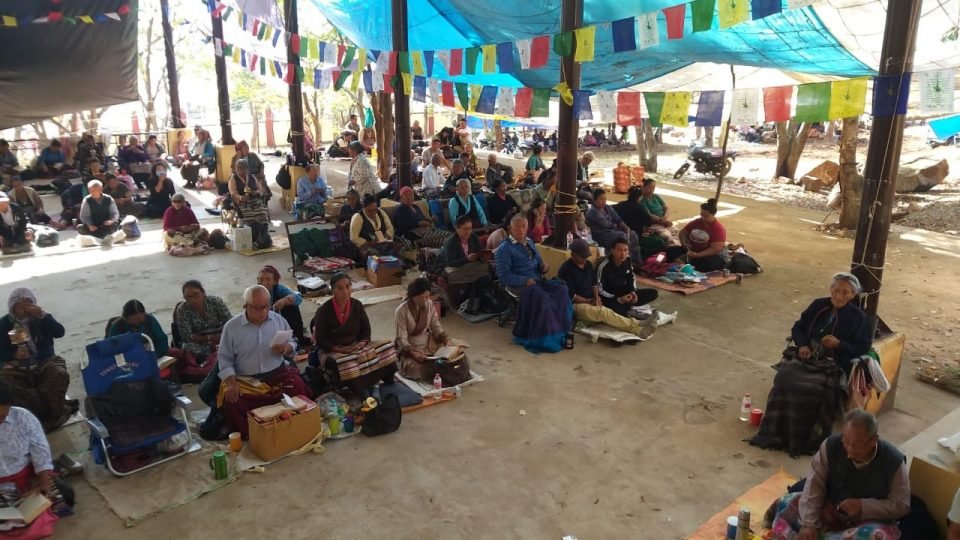
Community prayers and recitation of Amitabha mantra at Dhondenling Tibetan Settlement, under tents without a community hall.
Dhondenling Tibetan Settlement, Kollegal, is in one of the most remote and underdeveloped Tibetan settlements in Southern India.
There are 46 Tibetan settlements in India, Nepal, and Bhutan, home to most of the 100,451 Tibetan refugees. These Tibetan settlements originate from the wish of His Holiness the Dalai Lama to set up settlements where Tibetan refugees could live as an exclusive community in order to preserve the unique Tibetan culture including language and the religious practices.
Dhondenling Tibetan settlement is located in the majestic Biligiri Rangam hills in Karnataka; it was established in 1974 with over 3,500 people.
The current population of the settlement is now 4,500. The settlement is scattered in 22 village clusters. There are eight small monasteries, a school, and a small care-home for elders (FPMT Charitable Projects has been supporting the elderly home for the past three years by providing 70% of the annual budget.) The elderly home has a capacity for thirty-two residents. There is also a hospital and a traditional Tibetan medicine clinic. These establishments cater to the religious, educational, and health-care of the residents of the settlement. The residents have formed a cooperative society to cater to the agrarian needs of the members. The principal livelihood occupation is agriculture raising mainly corn, with millet, potato, and garlic as optional crops.
Most Tibetan settlements in India, Nepal, and Bhutan have a multi-purpose community hall, as a central gathering place for all within the settlement to hold special religious and cultural functions. However, Dhondenling Tibetan Settlement, being one of the poorest settlements, did not have a community hall and any gatherings held for the 4,500 residents would happen outside under tents or tarps.
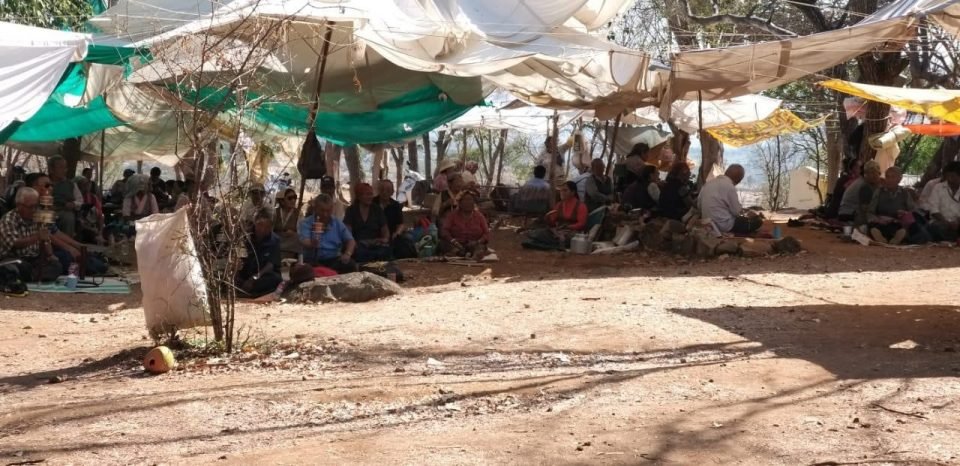
Community prayers continue at Dhondenling Tibetan Settlement despite the lack of proper accommodation for participants.
The community gatherings that happen throughout the year consist of:
- Public prayers for the long life of His Holiness the Dalai Lama, and other religious heads, and world peace
- Annual OM MANI PADME HUM recitation retreat and 100,000 Praises to Tara that require public attendance for over 45 days
- Celebration of religious and social festivals
- Dharma teaching discourses for the residents in general and the younger generation in particular
- Cultural programs and events by students to encourage children to participate in extracurricular activities
- Parent-Teacher interactive sessions to exchange ideas and development of partnership perspective concerning child upbringing and education
These gatherings and activities are vital for preserving the Tibetan cultural heritage and lineages and for providing community support for those living in the settlement.
Seeing the incredible need for this multi-purpose community hall in Dhondenling Tibetan Settlement, and recognizing how important it is to preserve the unique Tibetan cultural heritage, in 2020 we applied for and received a grant for the purpose of building this community hall.
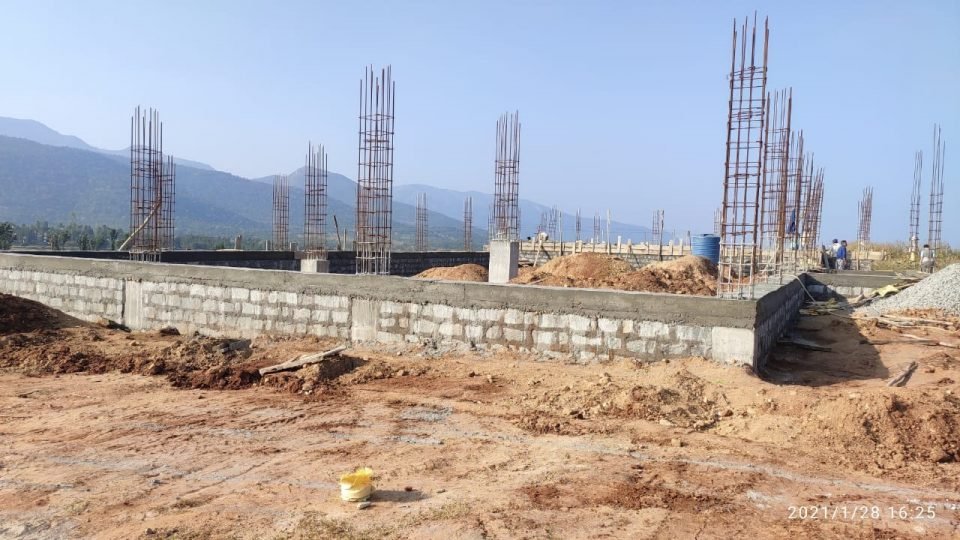
Site of the new community hall for Dhondenling Tibetan Settlement.
We were very happy to be a part of offering this support and US$158,741 was given to Dhondenling Tibetan Settlement for the building. In April 2020 they started the building process, buying necessary supplies for the foundations but quite soon due to COVID-19 restrictions which were strictly enforced by the government in South India, including in Dhondenling Tibetan Settlement, all building work was stopped in May. The lockdown was lifted after a few months, but there were still building restrictions and also restrictions in regards to outside people entering the Tibetan Settlement.
There was particular concern due to the fact that many people in the Tibetan Settlement live in very poor conditions and in close proximity. It was decided not to continue the building work of the community hall until the end of year (December 2020) due to precautions and to ensure not having too many outside laborers entering the Tibetan Settlement. All the building supplies that had been bought were carefully secured and protected during this time.
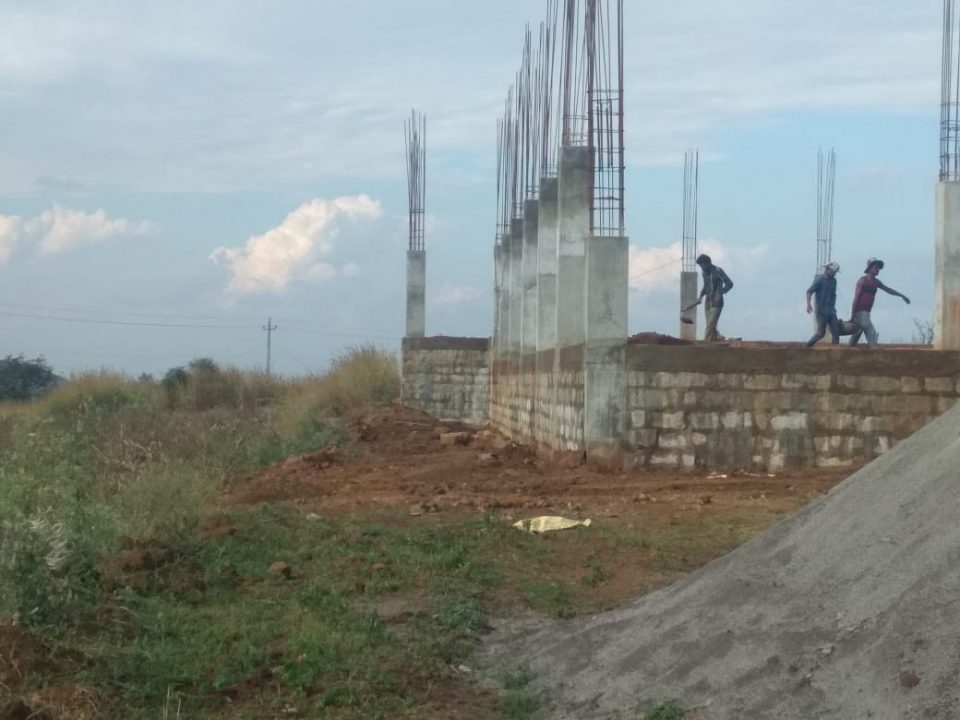
Work begins on this important community hall for 4,500 Tibetans.
From December 2020 to February 2021, the building work again commenced on the community hall. The work is going slower than expected, but is progressing.
We are extremely grateful to all who support the Social Services Fund, so that we can offer support such as this to Dhondeling Tibetan Settlement multi-purpose community hall for religious and cultural preservation and for the benefit of the 4,500 residents. Thank you.
All are welcome to support the Social Services Fund and help ensure beneficial grants like this can continue.
- Tagged: elderly, refugees, social services fund, tibetans
- Home
- News/Media
- Study & Practice
- About FPMT Education Services
- Latest News
- Programs
- New to Buddhism?
- Buddhist Mind Science: Activating Your Potential
- Heart Advice for Death and Dying
- Discovering Buddhism
- Living in the Path
- Exploring Buddhism
- FPMT Basic Program
- FPMT Masters Program
- FPMT In-Depth Meditation Training
- Maitripa College
- Lotsawa Rinchen Zangpo Translator Program
- Universal Education for Compassion & Wisdom
- Online Learning Center
- Prayers & Practice Materials
- Overview of Prayers & Practices
- Full Catalogue of Prayers & Practice Materials
- Explore Popular Topics
- Benefiting Animals
- Chenrezig Resources
- Death & Dying Resources
- Lama Chopa (Guru Puja)
- Lama Zopa Rinpoche: Compendium of Precious Instructions
- Lama Zopa Rinpoche: Life Practice Advice
- Lama Zopa Rinpoche Practice Series
- Lamrim Resources
- Mantras
- Prayer Book Updates
- Purification Practices
- Sutras
- Thought Transformation (Lojong)
- Audio Materials
- Dharma Dates – Tibetan Calendar
- Translation Services
- Publishing Services
- Teachings and Advice
- Find Teachings and Advice
- Lama Zopa Rinpoche Advice Page
- Lama Zopa Rinpoche: Compendium of Precious Instructions
- Lama Zopa Rinpoche Video Teachings
- ༧སྐྱབས་རྗེ་བཟོད་པ་རིན་པོ་ཆེ་མཆོག་ནས་སྩལ་བའི་བཀའ་སློབ་བརྙན་འཕྲིན།
- Podcasts
- Lama Yeshe Wisdom Archive
- Buddhism FAQ
- Dharma for Young People
- Resources on Holy Objects
- Ways to Offer Support
- Centers
- Affiliates Area
- Teachers
- Projects
- Charitable Projects
- Make a Donation
- Applying for Grants
- News about Projects
- Other Projects within FPMT
- Support International Office
- Projects Photo Galleries
- Give Where Most Needed
- FPMT
- Shop
Translate*
*powered by Google TranslateTranslation of pages on fpmt.org is performed by Google Translate, a third party service which FPMT has no control over. The service provides automated computer translations that are only an approximation of the websites' original content. The translations should not be considered exact and only used as a rough guide.To meet the challenge of our times, human beings will have to develop a greater sense of universal responsibility. Each of us must learn to work not just for his or her own self, family or nation, but for all.






